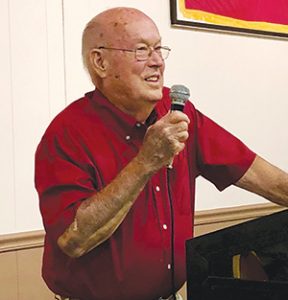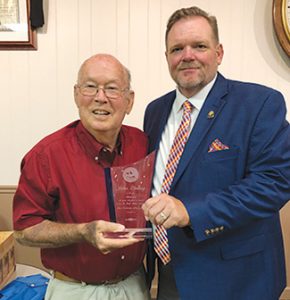By MARY ANN O’TOOLE HOLLEY
Correspondent

It’s been 68 years since John Ebeling went to work in the printing industry. For 44 of those years, he has served as vice president of the Communication Workers of America Local 6300-International Typographical Union Sector.
Ebeling said it was the consistency of dramatic changes that kept him on the job almost seven decades. But the change to the new normal of the COVID-19 pandemic convinced him it was time to retire.
“I’ve been easing into this retirement. When we started taking the COVID-19 virus seriously, it wasn’t a good idea for me to continue on. With my health problems, it could be a death sentence,” Ebeling said. “I’m 86 years old, and it’s been a wonderful career, with complete family support. I’ve also had good support from union brothers and sisters that I’ve had the privilege to work with.”
PRINTER’S INK IN HIS VEINS
A third generation typesetter, Ebeling says he came by his drive to better the lives and working conditions of the men and women in CWA-ITU naturally. His parents both worked as typesetters.

“I guess you could say the union brought them together,” Ebeling said. “Of course I come from a union family. My dad owned Weber-Ebeling printing with an Allied Label. My mom got her union card before him.”
Ebeling’s grandfather on his father’s side was secretary-treasurer of Printing Press Union Local 6. “It was in my blood,” he said.
When Ebeling started his apprenticeship with the typesetters union in 1952 at Mendel Printing Company, typesetters worked on manually-operated linotype machines, that, when working at 100 percent efficiency, could produce 14 lines per minute cast on the spot from hot lead.
“It was really labor intensive,” Ebeling recalls. “Mendel had gone to linotype and letter press. Then the Wellston Journal (where Ebeling continued his apprenticeship) went to hot metal and linotype.”
Ebeling’s career tracked the many changes in the printing industry, going from hand-setting hot type to cold type, to paste-up and then computers.
“You continue and you learn.” Ebeling said. “When the changes came, everybody in the local was learning. The changes affected all of our members at the same time. You changed whether you wanted to or not.
“I think that’s what keeps you on your toes,” he said. As a union leader, looking out for members in a rapidly changing industry, Ebeling said, you have to keep learning and be open-minded. “For all the years it’s been constant change,” he said.
After the Wellston Journal, Ebeling continued his apprenticeship at The Stockyard Reporter. His apprenticeship was interrupted by four years of active duty in the Naval Air Reserve, after which he went to work for the St. Louis Daily Record, where he completed his apprenticeship and became a journeyman with St. Louis Typographical Union Local 8.
“The St. Louis Daily Record was probably the first to go computerized in the area, that’s why I went there; to learn the system,” Ebeling said. “That’s what attracted me.”
Ebeling spent 13 years as the Daily Record chapel chairperson, and served on the executive committee of Local 8’s Board of Trustees and the local’s organizing and bargaining committees. In 1975, he was elected Local 8’s president.
In 1987, when the International Typographical Union (ITU) merged with the Communications Workers of America and formed the Printing, Publishing and Media Workers Sector, Ebeling became vice president of that sector.
A CHANGING INDUSTRY
Shortly after Ebeling was elected president of Local 8 in 1975, the St. Louis Post-Dispatch began transitioning work from their on-site print facility to an off-site process.
“Management was buying people out, offering termination incentives,” Ebeling said, noting that the termination incentives were negotiated in the union contract. “I was proud to be a part of the negotiations’ joint bargaining committee. At the time there were 11 unions represented at the Post-Dispatch.
“In the heyday, there were 700 members in the typographical union (at the Post),” Ebeling said. “Now, we have two members: one sends the ads overseas to be put together, and the other member checks the pages and forwards them to the pressroom. They are computer guys.
“They didn’t shut down,” he said, “But they changed the process, so they needed less people. They went from hot type to cold type, to pasting it up and then went to the computers.
“You do the best you can survive,” Ebeling said. “That’s why we merged with the CWA. Because there is strength in numbers.”
As the ITU and several other unions merged with the CWA, the various unions still wanted to save some of their individuality. That’s why the St. Louis CWA-ITU has an Allied logo, to recall the union’s beginnings. The ITU represents several smaller shops in the area. If you look at the union printer’s bug on work from those shops, you’ll see the Allied label.
A BIG FAMILY, AND WORK STILL TO BE DONE
Ebeling’s wife, Elaine, passed away 24 years ago. He has five children, 17 grandchildren, and 13 great grandchildren. Ebeling is an active member of Christ Prince of Peace Parish and a 60-year, 4th Degree member of the Knights of Columbus. He retired as 1st vice president of the St. Louis Labor Council Executive Board in 2019 after 44 years of service.
Although Ebeling is now retired from the union, he’s agreed to help his replacement with the transition. “We have 40 different contracts that are under CWA 6300,” he said, “and they’re not all exactly the same.”
In addition to representing smaller print shops, the ITU also represents some silk screeners, tee-shirt printers and embroidery workers.
Ebeling says he plans to continue working with the St. Louis Allied Printing Trades Council and the Missouri State Allied Printing Trades Association.


